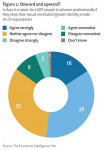Singapore’s small businesses plan to hand over reins to professional managers, says new Economist Intelligence Unit survey
The planned move toward professional management is a sign of maturity among Singaporean SBPs (defined for this survey as having an annual turnover of less than US$10m). It will also help to resolve an operating challenge facing many small companies·a shortage of skilled staff. This was a concern for 25% of survey respondents in Singapore.
Seven out of ten Singaporean respondents to the survey had founded their business, while two out of ten had inherited the business and one out of ten had bought the business. Making money is the chief motivation for 41% of Singapore’s SBPs, followed by a desire for personal fulfilment (37%). Entrepreneurial fervour pushes 31%, while 26% seek a challenge. Making money is of more importance to Singaporean SBPs than their counterparts elsewhere·the overall Asia sample puts personal achievement as the main driving force, followed by money and then entrepreneurial zest.
Other key findings from the survey, conducted in September and October 2006, are as follows:
· Dexterity is the biggest advantage of being small. Fully 54% of the respondents in Singapore believe their small size gives them an edge over their larger competition. The ability to respond promptly to changes in the business environment is valued by 26% of Singaporean SBPs, while 40% say their smaller size allows them to get closer to customers than their larger cousins can. Nimbleness is one counterbalance to the advantages enjoyed by larger companies, particularly deeper financial and other resources that can be used for continuous innovation and forays into new markets.
· Shortage of financing is a big hurdle. Singapore’s small businesses and professionals see a shortage of money as their biggest hurdle·48% of respondents fret about it, in line with a figure of 51% across the five markets surveyed. For working capital, 26% turn to banks, while 23% use retained earnings and 19% dip into personal savings. For seed money, though, Singapore’s SBPs rely on personal savings far more than their counterparts elsewhere·62% of Singaporean respondents use personal funds, compared with 51% of all SBPs across the five markets. Borrowing from a bank is a second option, chosen by 23% of respondents. One reason for the higher incidence of Singaporean SBPs turning to banks for working capital than for seed money is simply that financial institutions have begun to create financial incentives and loan packages designed to tap the burgeoning SME sector. SME Banking is now among the portfolios on offer at many of Singapore’s leading banks.
· Shortage of skilled staff is a concern. One-quarter of Singaporean SBPs surveyed were worried by a shortage of skilled staff. Savvy smaller companies often nurture talent that grows with the business. Because they usually cannot compete on salary, they try to attract and retain key managers by offering creative share-option incentives, or long-term career development. Entrepreneurs often hire employees based on their instincts·which usually serves them well, except when the company grows to a certain size.
· SBPs are confident of the future. Small businesses and professionals in Singapore are optimistic·57% of them believe that, overall, the operating environment is improving. Only 17% say things are getting worse. Their enthusiasm may seem subdued, compared with the Asian average (in which an overwhelming 72% of respondents are upbeat), but the bulk of Singaporean SBPs surveyed nonetheless are encouraged by the future, not least because they view their government as either helpful or very helpful. They do have gripes, though. Singaporean SBPs over the next three years want better financial aid and other incentives from their government (53% of respondents say so) and fewer bureaucratic procedures, especially in licensing, registration and financing (33%).
· Growing the business organically is the main strategy for growth. Unlike the Asian average, Singapore’s small businesses and professionals view organic growth as the best strategy (45% of respondents say so). Singapore’s SBPs also prefer to expand regionally instead of exploring other international waters·next door is usually the first stop. They are unenthusiastic, though, about mergers and acquisitions, and uninterested in expansion at home, perhaps because the domestic market is already quite crowded.
“Singapore’s small businesses and professionals, like most of their counterparts in Asia, display an entrepreneurial vibrancy that is vital for an economy to develop. They form an important segment of the SMEs that are fuelling growth in the region,” says Bina Jang, senior editor with the Economist Intelligence Unit and manager of the project.
According to Tan Chia Seng, CitiBusiness Head for Singapore, “Citibank commissioned this EIU report on small businesses and professionals or SBPs because we want to understand the needs of this specific segment so we can better serve them. SBPs want to be recognised and served as a priority customer group·not as the lower tier of larger businesses.”
Tapping the entrepreneur: what powers Asia’s small businesses and professionals and the Singapore component are available free-of-charge. Please find attached.
About the research
The survey polled 677small businesses and professionals (SBPs) in five Asian economies: Hong Kong, India, Malaysia, Singapore and South Korea. In Singapore, 120 SBPs responded.
Of the Singaporean respondents, 30% have annual turnover of S$7.8m-S$15m (US$5m-9.7m) and another 33% have revenues of S$1m-S$7.8m. In terms of staff, 42% have 5-20 employees, while 27% have 21-50 employees. A full 82% of respondents either owned or co-owned the company.
The views expressed are those of the Economist Intelligence Unit alone.
About the Economist Intelligence Unit
The Economist Intelligence Unit is the world leader in global business intelligence. It is the business-to-business arm of The Economist Group, which publishes The Economist newspaper.
The Economist Intelligence Unit provides geopolitical, economic and business analysis on more than 200 countries, as well as strategic intelligence on key industries and management practices. With over 300 full-time professionals in 40 offices around the world, supported by a global network of more than 700 contributing analysts, the Economist Intelligence Unit is widely known for its unparalleled coverage of major and emerging markets.
웹사이트: http://www.eiu.com
연락처
Edgar Fernandez
Marketing Manager, Asia-Pacific
(852) 2585 3826 이메일 보내기
Fax: (852) 2802 7007
이 보도자료는 Economist Intelligence Unit가(이) 작성해 뉴스와이어 서비스를 통해 배포한 뉴스입니다. 뉴스와이어는 편집 가이드라인을 준수합니다.




